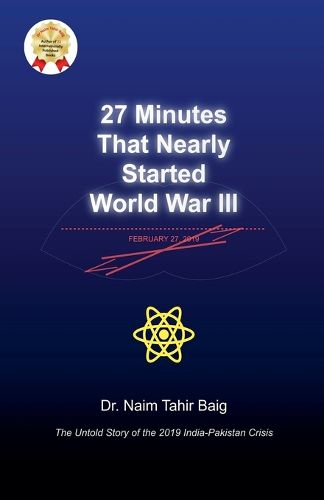Readings Newsletter
Become a Readings Member to make your shopping experience even easier.
Sign in or sign up for free!
You’re not far away from qualifying for FREE standard shipping within Australia
You’ve qualified for FREE standard shipping within Australia
The cart is loading…






This title is printed to order. This book may have been self-published. If so, we cannot guarantee the quality of the content. In the main most books will have gone through the editing process however some may not. We therefore suggest that you be aware of this before ordering this book. If in doubt check either the author or publisher’s details as we are unable to accept any returns unless they are faulty. Please contact us if you have any questions.
Book Description
"A masterful analysis of the most dangerous nuclear confrontation of the 21st century." - Foreign Affairs
On February 27, 2019, Indian and Pakistani fighter jets engaged in aerial combat over Kashmir for 27 minutes-the first such encounter between nuclear-armed powers since the end of the Cold War. What began with a suicide bombing in Pulwama escalated to airstrikes on Pakistani territory and could have spiraled into catastrophic nuclear war. Former U.S. Secretary of State Mike Pompeo would later reveal that the world came "perilously close to nuclear conflagration" during this crisis.
In this definitive account, Dr. Naim Tahir Baig draws on his extensive diplomatic experience and interviews with key decision-makers to provide unprecedented insight into those harrowing 27 minutes and their aftermath. Through meticulous research and analysis, he reconstructs the chain of events from the Pulwama attack through India's Balakot airstrike to Pakistan's Operation Swift Retort, revealing previously undisclosed details about military planning, intelligence failures, and diplomatic interventions that prevented escalation to full-scale war.
Beyond chronicling this dangerous episode, Dr. Baig explores its profound implications for regional security, nuclear deterrence theory, and international crisis management. He examines how social media, domestic politics, and information warfare influenced decision-making on both sides, creating new challenges for traditional de-escalation mechanisms.
"27 Minutes That Nearly Started World War III" offers critical lessons not just for South Asia but for all nuclear-armed states navigating an increasingly complex global security environment. In an age of rising nationalism, technological change, and great power competition, the India-Pakistan crisis of 2019 serves as a sobering reminder of how quickly conflicts can escalate-and how catastrophic the consequences might be if we fail to learn from this near miss.
$9.00 standard shipping within Australia
FREE standard shipping within Australia for orders over $100.00
Express & International shipping calculated at checkout
This title is printed to order. This book may have been self-published. If so, we cannot guarantee the quality of the content. In the main most books will have gone through the editing process however some may not. We therefore suggest that you be aware of this before ordering this book. If in doubt check either the author or publisher’s details as we are unable to accept any returns unless they are faulty. Please contact us if you have any questions.
Book Description
"A masterful analysis of the most dangerous nuclear confrontation of the 21st century." - Foreign Affairs
On February 27, 2019, Indian and Pakistani fighter jets engaged in aerial combat over Kashmir for 27 minutes-the first such encounter between nuclear-armed powers since the end of the Cold War. What began with a suicide bombing in Pulwama escalated to airstrikes on Pakistani territory and could have spiraled into catastrophic nuclear war. Former U.S. Secretary of State Mike Pompeo would later reveal that the world came "perilously close to nuclear conflagration" during this crisis.
In this definitive account, Dr. Naim Tahir Baig draws on his extensive diplomatic experience and interviews with key decision-makers to provide unprecedented insight into those harrowing 27 minutes and their aftermath. Through meticulous research and analysis, he reconstructs the chain of events from the Pulwama attack through India's Balakot airstrike to Pakistan's Operation Swift Retort, revealing previously undisclosed details about military planning, intelligence failures, and diplomatic interventions that prevented escalation to full-scale war.
Beyond chronicling this dangerous episode, Dr. Baig explores its profound implications for regional security, nuclear deterrence theory, and international crisis management. He examines how social media, domestic politics, and information warfare influenced decision-making on both sides, creating new challenges for traditional de-escalation mechanisms.
"27 Minutes That Nearly Started World War III" offers critical lessons not just for South Asia but for all nuclear-armed states navigating an increasingly complex global security environment. In an age of rising nationalism, technological change, and great power competition, the India-Pakistan crisis of 2019 serves as a sobering reminder of how quickly conflicts can escalate-and how catastrophic the consequences might be if we fail to learn from this near miss.